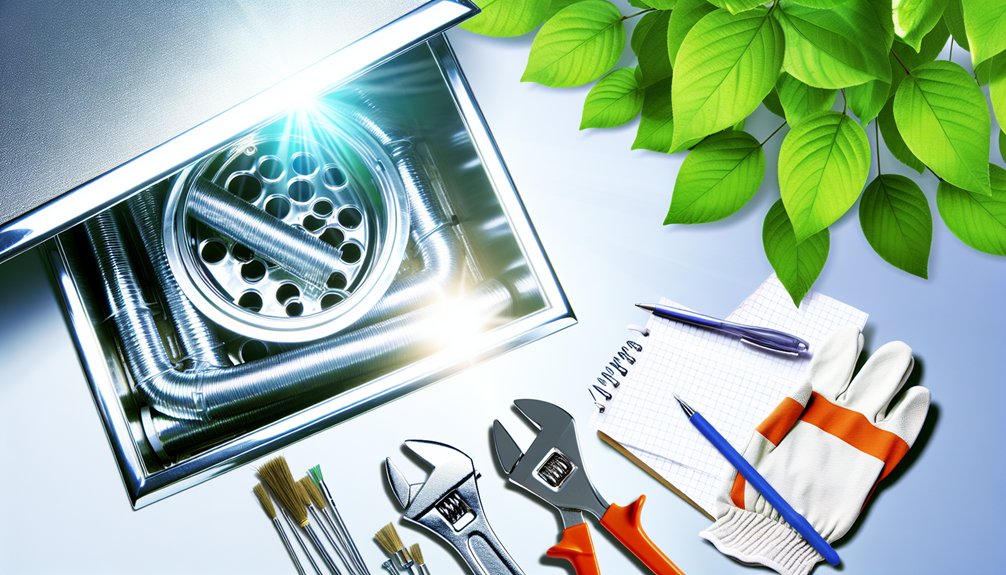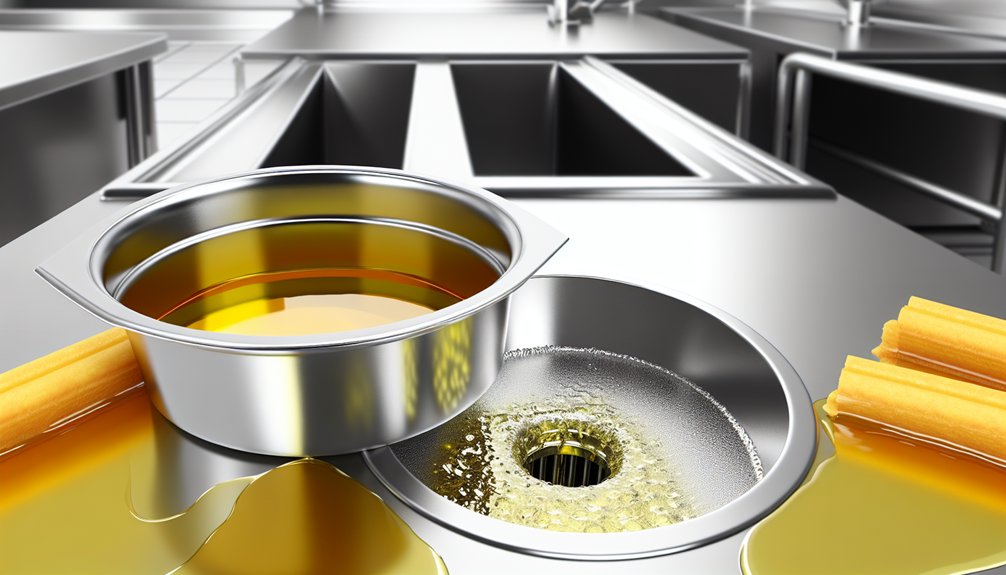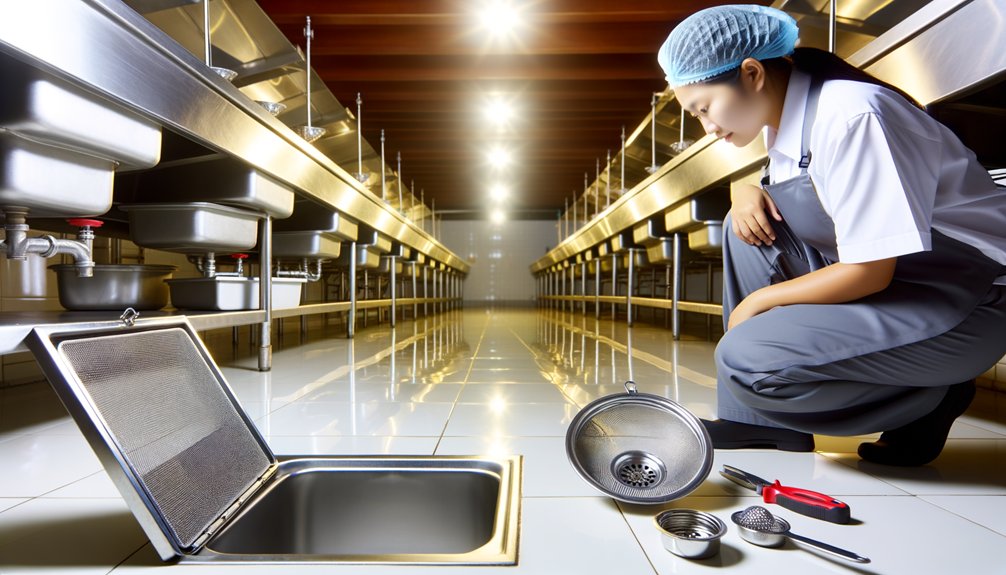Effective commercial drain maintenance involves key practices to prevent clogs and prolong plumbing systems. Establish a regular maintenance schedule for inspections and cleanings. Install drain screens and strainers to capture debris. Properly dispose of grease and oils using designated containers. Train employees on waste disposal protocols to minimize issues. Limit the use of chemical drain cleaners in favor of natural alternatives. Consider water softening systems for enhanced efficiency. Each measure contributes to ideal drainage performance and longevity. Further insights can enhance these strategies.
Develop a Regular Maintenance Schedule

Establishing a regular maintenance schedule for commercial drains is vital for maintaining ideal plumbing performance. This schedule should ideally include inspections and commercial drain cleaning at least once or twice a year to prevent severe clogs and plumbing issues. The frequency of these maintenance activities must be tailored to the size and complexity of the plumbing system, as high-traffic establishments may require more routine checks.
Incorporating preventative drain maintenance, such as regular inspections of grease traps and floor drains, guarantees functionality and minimizes odors. Early identification of potential issues can prevent costly repairs or service disruptions. Documenting all maintenance activities and findings is essential for tracking the plumbing system's health and adjusting future schedules accordingly. By prioritizing a structured maintenance approach, businesses can liberate themselves from the burden of unexpected plumbing crises, fostering a more efficient and reliable operational environment.
Install Drain Screens and Strainers
Installing drain screens and strainers in commercial settings serves as a proactive measure to capture solids and debris, notably mitigating the risk of clogs within the plumbing system. These devices are essential in environments such as commercial kitchens, where food waste is prevalent.
Regular maintenance of drain screens is vital, as accumulated debris can lead to reduced water flow and potential backups. Businesses benefit considerably from implementing high-quality strainers that are easy to install and remove, facilitating routine cleaning and inspections.
Regular upkeep of drain screens is crucial to ensure optimal water flow and prevent backups in commercial settings.
Key benefits include:
- Reduction of clogged drains: Effective capture of debris prevents blockages.
- Enhanced sanitation: Prevents food particles from entering the sewer system.
- Prolonged plumbing lifespan: Regular maintenance minimizes costly repairs.
- Time-efficient routine cleaning: Simple access promotes proactive care.
Dispose of Grease and Oils Properly

Effective grease management practices are essential in commercial kitchens to prevent drainage issues. Utilizing proper disposal containers for used oils and grease minimizes the risk of clogs, while training staff on these protocols guarantees compliance and promotes a hygienic environment. Implementing these measures greatly reduces plumbing emergencies and maintenance costs associated with grease buildup.
Grease Management Practices
Proper grease management is essential for maintaining the longevity and efficiency of commercial drainage systems. Implementing effective grease management practices can greatly reduce the risk of clogs. Key strategies include:
- Utilizing grease traps to capture fats, oils, and grease before they enter the drainage system.
- Collecting used cooking oils in designated containers to prevent solidification in pipes.
- Training staff to dispose of food waste and grease in trash bins rather than sinks, promoting responsible waste disposal.
- Scheduling routine professional cleanings of grease traps to guarantee peak drainage efficiency in commercial kitchens.
Proper Disposal Containers
The implementation of designated disposal containers is vital for managing grease and oils in commercial kitchens. Proper grease disposal containers should be clearly labeled and used exclusively for this purpose, preventing improper disposal down drains. Employees must be trained to allow grease to solidify before disposal, which minimizes the risk of clogs in restaurants. This practice is critical for effective drain maintenance, as it aids in preventing backups that can compromise grease traps. In addition, collaboration with local waste management services guarantees environmentally responsible disposal of collected oils and grease. By separating grease from food scraps and utilizing designated disposal containers, commercial properties can maintain effective preventative drain strategies, ultimately enhancing operational efficiency and safeguarding plumbing systems.
Staff Training Importance
Although many employees may overlook the significance of proper grease and oil disposal, effective staff training plays an essential role in preventing costly drain clogs in commercial kitchens. Proper education guarantees that staff understand the implications of improper disposal practices and the necessity of maintaining plumbing systems. Key components of staff training include:
- Recognizing that pouring grease down the drain leads to solidification and buildup.
- Utilizing designated containers for used oils to avoid drainage system contamination.
- Understanding the function and maintenance of grease traps.
- Emphasizing the importance of waste management practices in fostering a plumbing-protective culture.
Regular training sessions enhance awareness, ultimately supporting drain cleaning services and maintenance services to prevent clogs and guarantee smooth kitchen operations.
Train Employees on Proper Waste Disposal

Training employees on proper waste disposal is essential for maintaining effective drainage systems in commercial kitchens, as improper practices can lead to significant clogs and costly repairs. Educating staff on the importance of separating waste, particularly grease and oils, reduces the likelihood of drainage issues. Conducting training sessions focused on the use of designated containers for food scraps and fats fosters responsible waste management behaviors.
Additionally, implementing clear signage near sinks and disposal areas serves as a constant reminder for employees regarding correct disposal methods, thereby promoting a culture of plumbing protection. Regular workshops that demonstrate the consequences of improper waste disposal reinforce the importance of maintaining clear drains, minimizing the risk of expensive plumbing repairs. Ultimately, tracking employee adherence to waste disposal protocols highlights areas for improvement, ensuring that all staff contribute to effective drain maintenance and support the overall functionality of the commercial kitchen's plumbing system.
Minimize the Use of Chemical Drain Cleaners
Minimizing the use of chemical drain cleaners is essential for preserving the integrity of plumbing systems in commercial settings. These products can weaken pipes over time, leading to expensive repairs. Additionally, they often emit harmful fumes that pose health risks to employees and customers. Relying on such solutions encourages a cycle of temporary fixes, failing to address the underlying causes of clogged drains.
Minimizing chemical drain cleaners protects plumbing integrity and promotes a healthier environment for employees and customers.
To effectively maintain your plumbing and promote sustainability, consider the following preventive measures:
- Utilize natural or enzymatic cleaners to safely break down organic material.
- Implement routine drain cleaning with hot water and mild detergents.
- Conduct regular commercial drain inspections to identify potential blockages before they escalate.
- Educate staff on proper waste disposal practices to reduce clogging incidents.
Consider Investing in a Water Softening System
Investing in a water softening system presents a strategic solution for businesses seeking to enhance their plumbing efficiency and minimize maintenance costs. Hard water, characterized by high levels of minerals such as calcium and magnesium, contributes to significant scale buildup in plumbing systems. By implementing a water softening system, businesses can effectively reduce this buildup, resulting in fewer clogs and related maintenance issues. Softened water promotes smoother flow within pipes, leading to cleaner drains and decreasing the reliance on chemical cleaners.
Moreover, the efficacy of soaps and detergents is improved, making it particularly beneficial for commercial kitchens and laundries. This system not only safeguards plumbing infrastructure but also extends the lifespan of appliances that utilize water, such as dishwashers and washing machines. Ultimately, the adoption of a water softening system serves as a proactive preventive measure that reduces long-term operational costs associated with maintenance and repairs.
Schedule Regular Commercial Drain Cleaning Sessions
Establishing a regular drain cleaning schedule is essential for maintaining ideal drainage in commercial establishments. The frequency of these sessions should be determined based on the level of business activity, with low-traffic buildings requiring annual cleaning and high-traffic locations benefiting from semi-annual sessions. Monitoring business operations and documenting maintenance activities can help identify trends and preemptively address potential drainage issues.
Determine Cleaning Frequency
How often should commercial drains be cleaned to guarantee peak performance? Determining the cleaning frequency is essential for effective maintenance and to help keep drains and pipes functioning at their best. For low-traffic commercial buildings, annual cleaning sessions are typically sufficient. Conversely, high-traffic establishments should adopt a semi-annual routine to combat increased waste and grease buildup. Regular cleaning not only mitigates potential issues but also enhances the longevity of plumbing systems.
Consider these factors when establishing a cleaning schedule:
- Business traffic volume
- Type of waste generated
- Industry guidelines
- Historical maintenance trends
Monitor Business Activity
While routine drain cleaning is essential for maintaining plumbing systems, monitoring business activity to schedule these sessions is equally important. Establishments with varying traffic levels should regularly clean their drains based on usage patterns. Low-traffic buildings can schedule annual cleanings, while high-traffic venues may require semi-annual sessions to prevent clogged pipes. By evaluating business needs, especially during peak operational periods, such as holidays, companies can keep their kitchen drains functioning efficiently. Regularly cleaning the drainage system allows for early identification of significant problems, potentially avoiding costly repairs. Additionally, businesses should maintain a cleaning schedule and log any issues to track the plumbing system's health and refine future maintenance efforts effectively.
Frequently Asked Questions
How Often Should Commercial Drains Be Cleaned?
In the domain of commerce, a well-maintained drainage system is akin to a finely tuned engine; neglect can lead to catastrophic failure. Drain cleaning frequency should be determined by business traffic, with scheduled maintenance recommended at least once or twice annually for high-traffic establishments. Seasonal inspections can reveal signs of clogs, often caused by grease or debris. Proactive measures guarantee drainage system health, safeguarding against costly disruptions that impact business efficiency.
What Do Professionals Use to Clean Drains?
Professionals utilize a variety of drain cleaning tools and techniques to maintain ideal drainage systems. Common methods include plumbing snakes for physical blockages and high-pressure jetting for stubborn clogs. Eco-friendly solutions, such as bio enzyme cleaners, effectively break down organic matter without harmful chemicals. Additionally, drain inspection cameras are employed to identify issues proactively, while traditional drain cleaning chemicals may also be used in certain situations, ensuring an all-encompassing approach to drain maintenance.
How to Use Instant Power Commercial Drain Maintainer?
To effectively utilize Instant Power Commercial Drain Maintainer, one must understand its application techniques and benefits. Users should pour the recommended amount into the drain, allowing it to rest for about 30 minutes, followed by hot water to enhance effectiveness. Regular use can reduce major drain issues, promoting proactive drain maintenance. Safety precautions include ensuring compatibility with plumbing systems, while frequency recommendations suggest routine applications to prevent buildup, thereby addressing troubleshooting issues efficiently.
How Long Do You Leave Vinegar and Baking Soda in the Drain?
The recommended duration for leaving vinegar and baking soda in the drain during drain cleaning is approximately 30 minutes. This allows sufficient time for the chemical reaction to occur, which aids in odor removal and tackling clogged drains. For more stubborn blockages, extending the wait time to an hour or more may enhance results. Regular maintenance frequency, utilizing these DIY solutions, can effectively prevent buildup and guarantee plumbing systems function efficiently.


